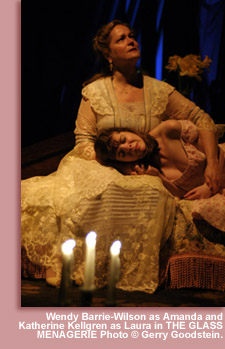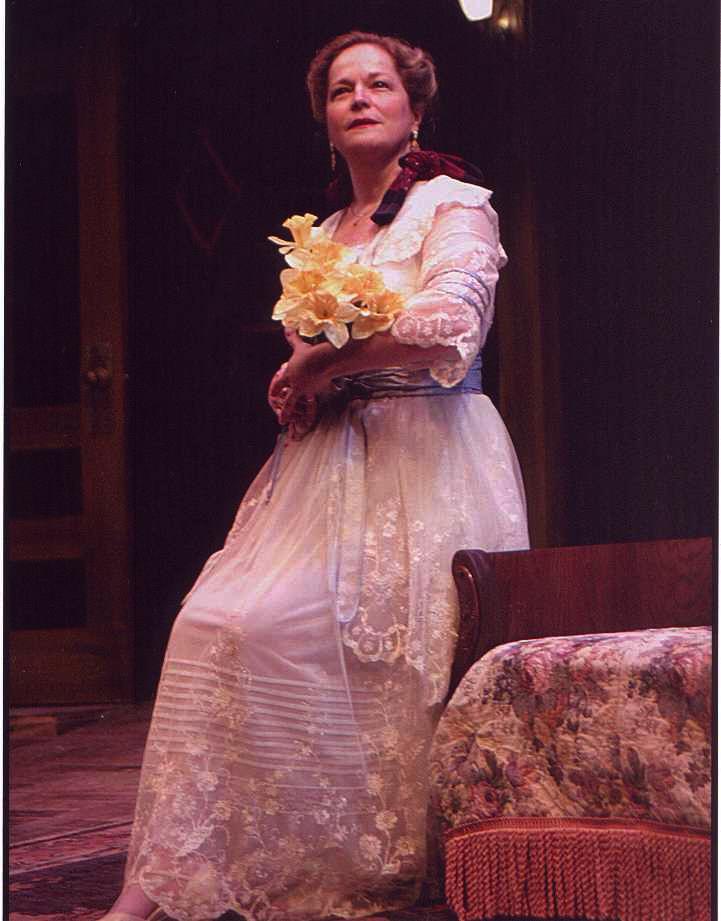|
The
Glass Menagerie
Directed by Robert Cuccioli Shakespeare Theatre of New Jersey
|

| A
mother with more strength and less despair.
Monday,
June 30, 2003 BY
PETER FILICHIA Jessica
Tandy once portrayed Amanda Wingfield in "The Glass Menagerie"
-- and failed. Julie Harris later attempted the role, too, and fared even
less well. But
Wendy Barrie-Wilson, with far less fame and reputation, is giving an
astonishing performance as Tennessee Williams' famous faded Southern
belle. She's well worth seeing in the production at the Shakespeare
Theatre of New Jersey in Madison. Too
many actresses stress Amanda's bitterness at being abandoned by her
husband. Many actresses overdo her despair at having two grown children
who still live with her. Tom has a low-paying job. Laura has a limp.
Neither has prospects. Barrie-Wilson
instead masks Amanda's discouragement, and looks to the future. True, the
slightest sad memory can immediately dash her mood. But she doesn't stay
down for long. She listens intently to whatever her kids have to tell her,
though the glint in her eye shows she's holding out for good news. If none
comes, she rebounds. Even after Tom insults her, she patiently waits for
the apology that she knows will come. The
actress stresses Amanda's strength. After she intones, "Life calls
for Spartan endurance," she bolts up from her chair and stands
ram-rod straight to illustrate how brute force must be used to combat
adversity. Her two scenes where she gives her all to her telemarketing job
are quite moving, too. But
when Amanda is happy -- which she is, after Tom announces he's bringing
home his pal Jim to meet Laura -- she literally jumps with joy, and
becomes the coquette of yore. Yet what Barrie-Wilson most brings to the
part, shown through her smile and her soul, is her genuine love for her
children. She hugs, caresses, and tickles them the way loving parents do.
Most Amandas don't. Purists
may carp that a theater devoted to Shakespeare is presenting a play that
was written 328 years after the Bard wad buried. But Malvolio is mentioned
in the first act, Romeo in the second, and Jim calls Tom
"Shakespeare" quite a bit. Still, even if none of these names
showed up in the text, any theatergoer would be grateful that Wendy
Barrie-Wilson is on stage.
|
|
Variety In its current revival at the Shakespeare Theater of New Jersey, "The Glass Menagerie" reaffirms the wondrous spell Tennessee Williams can cast. The production marks the dramatic directorial debut of Robert Cuccioli, once Broadway's elusively cunning Jekyll and Hyde. Under his perceptive guidance, the play's gentle humor emerges, and its evocative melancholia envelops the heart and singes the soul. The Amanda of Wendy
Barrie-Wilson is exceptionally absorbing. As a faded, displaced former
Southern belle, she is grandly garrulous and annoyingly possessive. Her
reaction to the upcoming visitation of a gentleman caller with her shy,
crippled daughter is all spirited flutter, touched with giddy grandeur.
Recalling the genteel Southern charm of her youth, she sweetly captures
the rhythm and grace of Williams' poetic text. All the desperation, warmth
and humor are in place. She is one of the finest Amanda Wingfields in
memory, and can proudly take her place alongside the memorable Amandas in
this critic's experience: Helen Hayes, Jessica Tandy, Julie Harris and
Maureen Stapleton.
|
